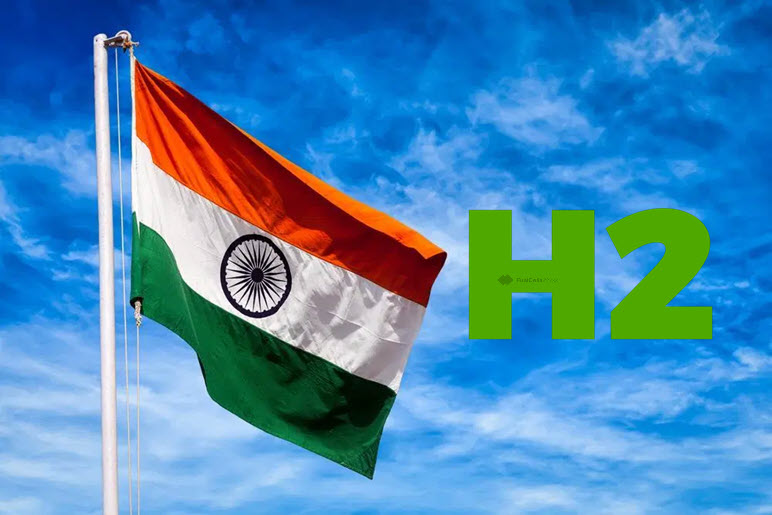
India’s government-owned Bharat Petroleum Corporation Ltd (BPCL) has tied up with Bhabha Atomic Research Centre (BARC) to scale up alkaline electrolyser technology for green hydrogen production. Presently, electrolyser plants are imported into India from China, Japan, Sweden and a host of other countries.
This is the first of its kind initiative any corporate has taken to support India’s commitment to achieve renewable energy targets and reduce greenhouse gas emissions. Domestic manufacturing of electrolyser plants, an import substitute, will help India achieve ‘atmanirbhar’.
“BPCL is fully committed towards environment protection and ensuring a greener planet. We have been extensively leveraging technology in all our activities. Today, through collaboration with BARC, we intend to scale up Indigenous alkaline electrolyser technology and look forward to commercializing it for large use especially in refineries. This will be another step towards ‘atmanirbhar Bharat’ in our journey for achieving net zero emissions by 2040,” said Arun Kumar Singh, Chairman and Managing Director, BPCL.
Currently, refineries use large quantities of hydrogen for de-sulfurization to make petrol, diesel and other chemicals. Hydrogen is made at the refinery via. steam reforming of natural gas which releases a huge quantity of carbon into the air. Thus, petroleum refining segment has been identified as one of the major sources of carbon emission. To curb carbon release from this segment, refiners set up large scale electrolysers to produce green hydrogen from water and thereby decarbonize hydrogen production.
This was part of BPCL’s move towards renewable energy and thereby reduce carbon emission. The company has embarked upon plans to expand its portfolio of renewable energy with solar, wind and biofuels thereby reaffirming its commitment towards sustainability and reduction of carbon footprint. The company intends to meet power requirement for new projects in its refineries, primarily from renewable sources.
To achieve its goal, the company is planning to invest Rs 50,000 – 60,000 crore in the next three-five years to strengthen its non-core businesses. The company has no plans to expand its existing operations at any of its three refineries i.e. Bina, Kochi and Mumbai as all these plants are operating with full capacity. The capacity of these refineries is adequate to cater to the future requirement.
“For its electrolyser plant, BPCL has kept the timeline as 2022 for its demonstration. “We are inline with the government’s projection to achieve 10 per cent of green hydrogen capacity in three years. We are on track to achieve that,” said a senior company official.
While refineries were facing cyclical challenges, the pandemic situation has perpetrated both structural and disruptive changes in the business. As regards to physical performance, the pandemic related demand disruptions resulted in a 17 per cent decline in BPCL’s refinery throughput to 26.40 million tonnes for 2020-21 from 31.91 million tonnes reported in the previous financial year. BPCL’s sales also fell by 10 per cent to 38.74 million tonnes during the financial year 2020-21 compared to 43.10 million tonnes posted in the last financial year.
The company reported a total standalone revenue of Rs 301,864.98 crore for the financial year 2020-21 compared to Rs 327,580.78 crore in the previous financial year. Despite a decline in sales, BPCL reported over six-fold increase in its standalone net profit to Rs 18,041.67 crore for the financial year 2020-21 versus Rs 2,683.19 crore for the previous year.
During the financial year 2020-21, the pandemic induced shutdowns and disruptions in economic activity caused a significant decline in the demand of petroleum products in India with its consumption in the country dropping to 194.6 million tonnes as against 214.1 million tonnes in the previous year.
Meanwhile, India’s crude oil refining capacity stood at 249.9 million tonnes as of April 1, 2021, with 65 per cent held by public sector refiners and their group companies. While the crude processing has been surpassing the installed capacity since past many years, the pandemic related disruption during 2020-21 has restricted the refinery capacity utilization to 88.8 per cent as the country processed 221.8 million tonnes of crude oil during the year as against 254.4 million tonnes in the previous year.
To cater to the future demand, companies in the oil and gas sector have increased their focus towards oil to chemical and petrochemical processes to capitalize on the opportunity and create a hedge in their product portfolio besides increasing the profitability.
Read the most up to date Fuel Cell and Hydrogen Industry news at FuelCellsWorks




